COLLABORATIVE MENTAL HEALTH NURSING PRACTICE.
VerifiedAdded on 2022/11/15
|11
|2907
|2
AI Summary
This assignment is reflection.
Please include all the contain that is mentioned in the marking criteira. I have attached marking criteria and also another file where our tutor has mentioned about the key terms in this assignment and about the things that needs to be included in this assignment . Also please include intex citation to support the sentence. Please read all three files carefully that I have attached here.
Reference-Eight peer reviewed articles not less that 5 years in Harvard style.
I Kindly request you to follow all the instructions of the file that I have provided.
Contribute Materials
Your contribution can guide someone’s learning journey. Share your
documents today.
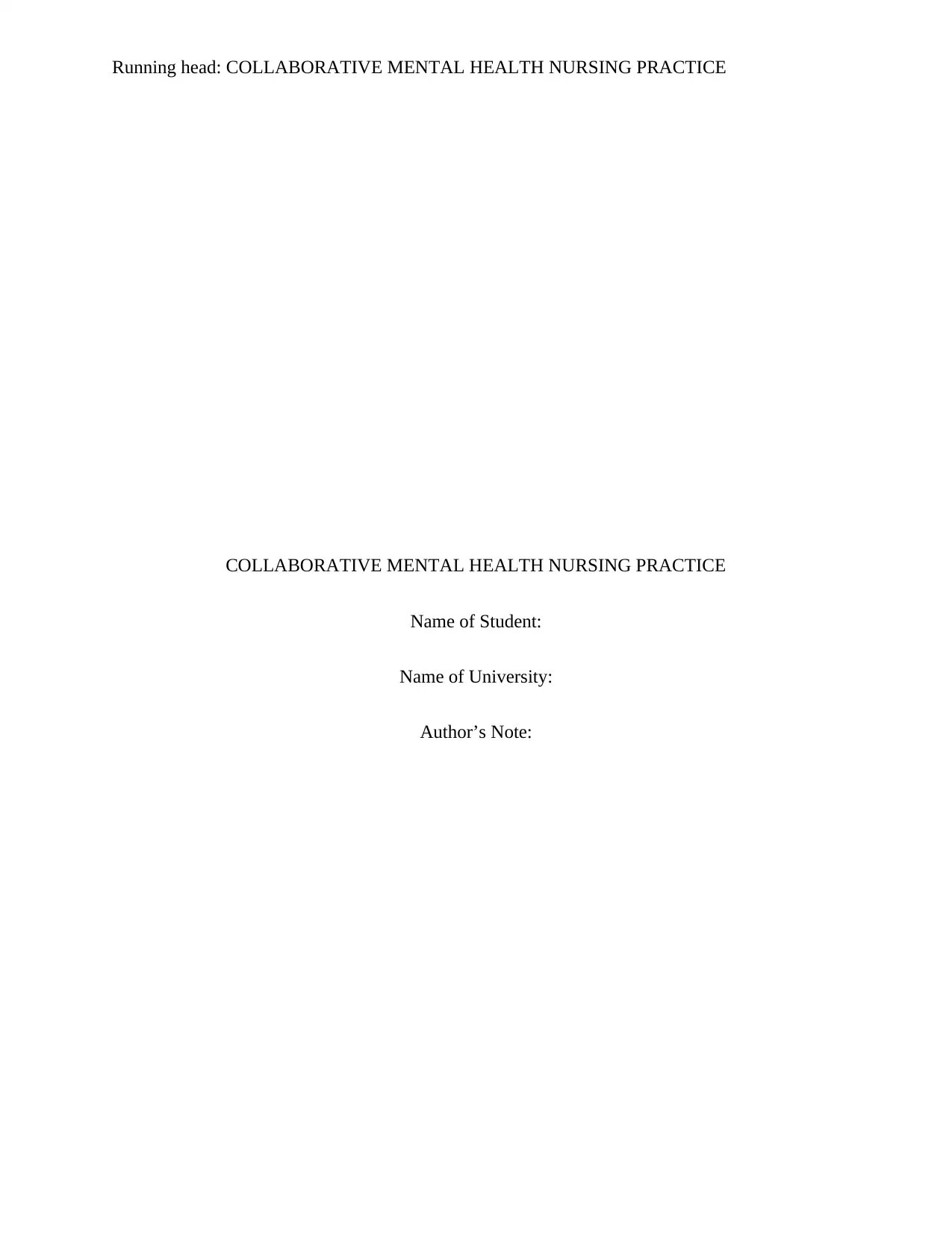
Running head: COLLABORATIVE MENTAL HEALTH NURSING PRACTICE
COLLABORATIVE MENTAL HEALTH NURSING PRACTICE
Name of Student:
Name of University:
Author’s Note:
COLLABORATIVE MENTAL HEALTH NURSING PRACTICE
Name of Student:
Name of University:
Author’s Note:
Secure Best Marks with AI Grader
Need help grading? Try our AI Grader for instant feedback on your assignments.
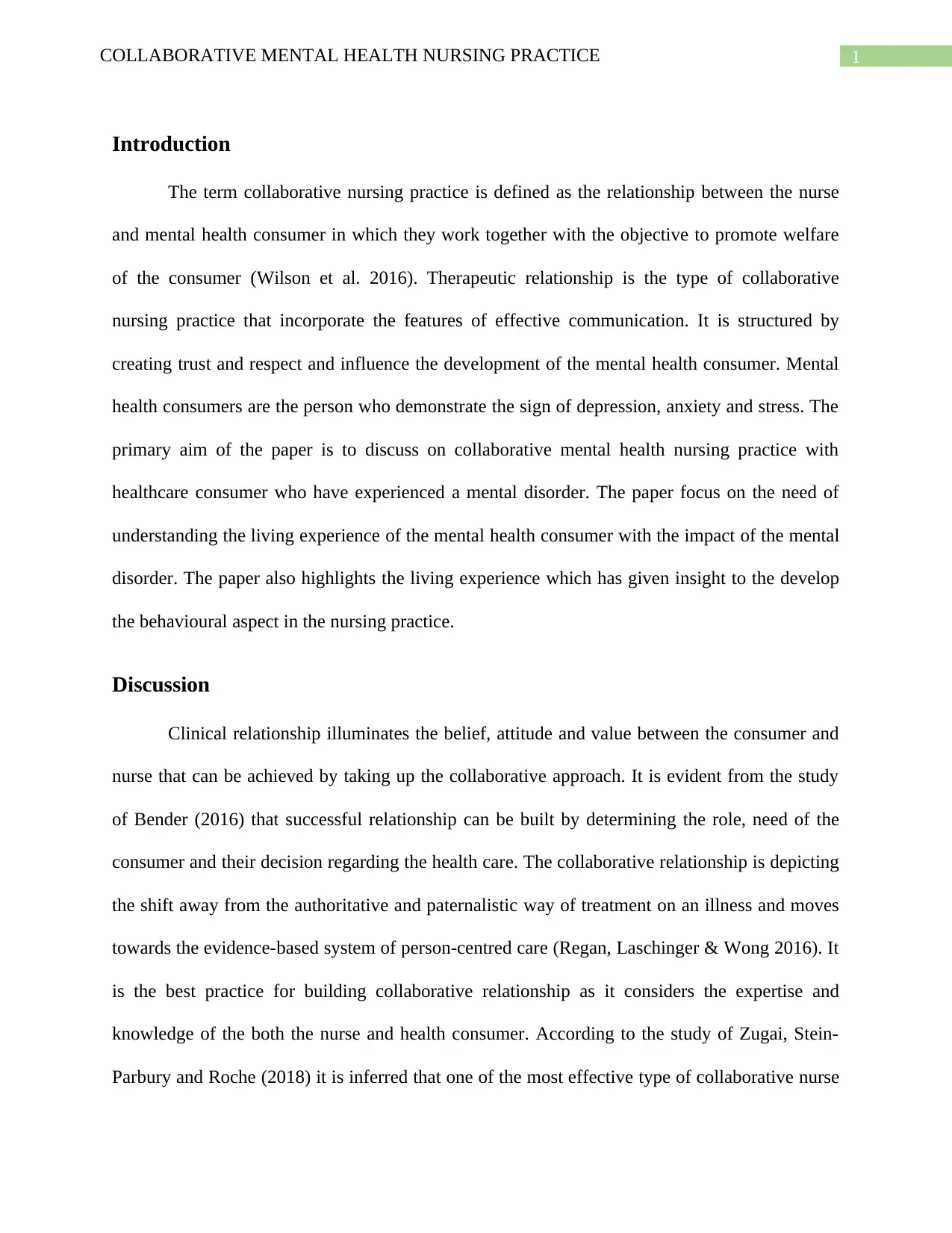
1COLLABORATIVE MENTAL HEALTH NURSING PRACTICE
Introduction
The term collaborative nursing practice is defined as the relationship between the nurse
and mental health consumer in which they work together with the objective to promote welfare
of the consumer (Wilson et al. 2016). Therapeutic relationship is the type of collaborative
nursing practice that incorporate the features of effective communication. It is structured by
creating trust and respect and influence the development of the mental health consumer. Mental
health consumers are the person who demonstrate the sign of depression, anxiety and stress. The
primary aim of the paper is to discuss on collaborative mental health nursing practice with
healthcare consumer who have experienced a mental disorder. The paper focus on the need of
understanding the living experience of the mental health consumer with the impact of the mental
disorder. The paper also highlights the living experience which has given insight to the develop
the behavioural aspect in the nursing practice.
Discussion
Clinical relationship illuminates the belief, attitude and value between the consumer and
nurse that can be achieved by taking up the collaborative approach. It is evident from the study
of Bender (2016) that successful relationship can be built by determining the role, need of the
consumer and their decision regarding the health care. The collaborative relationship is depicting
the shift away from the authoritative and paternalistic way of treatment on an illness and moves
towards the evidence-based system of person-centred care (Regan, Laschinger & Wong 2016). It
is the best practice for building collaborative relationship as it considers the expertise and
knowledge of the both the nurse and health consumer. According to the study of Zugai, Stein‐
Parbury and Roche (2018) it is inferred that one of the most effective type of collaborative nurse
Introduction
The term collaborative nursing practice is defined as the relationship between the nurse
and mental health consumer in which they work together with the objective to promote welfare
of the consumer (Wilson et al. 2016). Therapeutic relationship is the type of collaborative
nursing practice that incorporate the features of effective communication. It is structured by
creating trust and respect and influence the development of the mental health consumer. Mental
health consumers are the person who demonstrate the sign of depression, anxiety and stress. The
primary aim of the paper is to discuss on collaborative mental health nursing practice with
healthcare consumer who have experienced a mental disorder. The paper focus on the need of
understanding the living experience of the mental health consumer with the impact of the mental
disorder. The paper also highlights the living experience which has given insight to the develop
the behavioural aspect in the nursing practice.
Discussion
Clinical relationship illuminates the belief, attitude and value between the consumer and
nurse that can be achieved by taking up the collaborative approach. It is evident from the study
of Bender (2016) that successful relationship can be built by determining the role, need of the
consumer and their decision regarding the health care. The collaborative relationship is depicting
the shift away from the authoritative and paternalistic way of treatment on an illness and moves
towards the evidence-based system of person-centred care (Regan, Laschinger & Wong 2016). It
is the best practice for building collaborative relationship as it considers the expertise and
knowledge of the both the nurse and health consumer. According to the study of Zugai, Stein‐
Parbury and Roche (2018) it is inferred that one of the most effective type of collaborative nurse
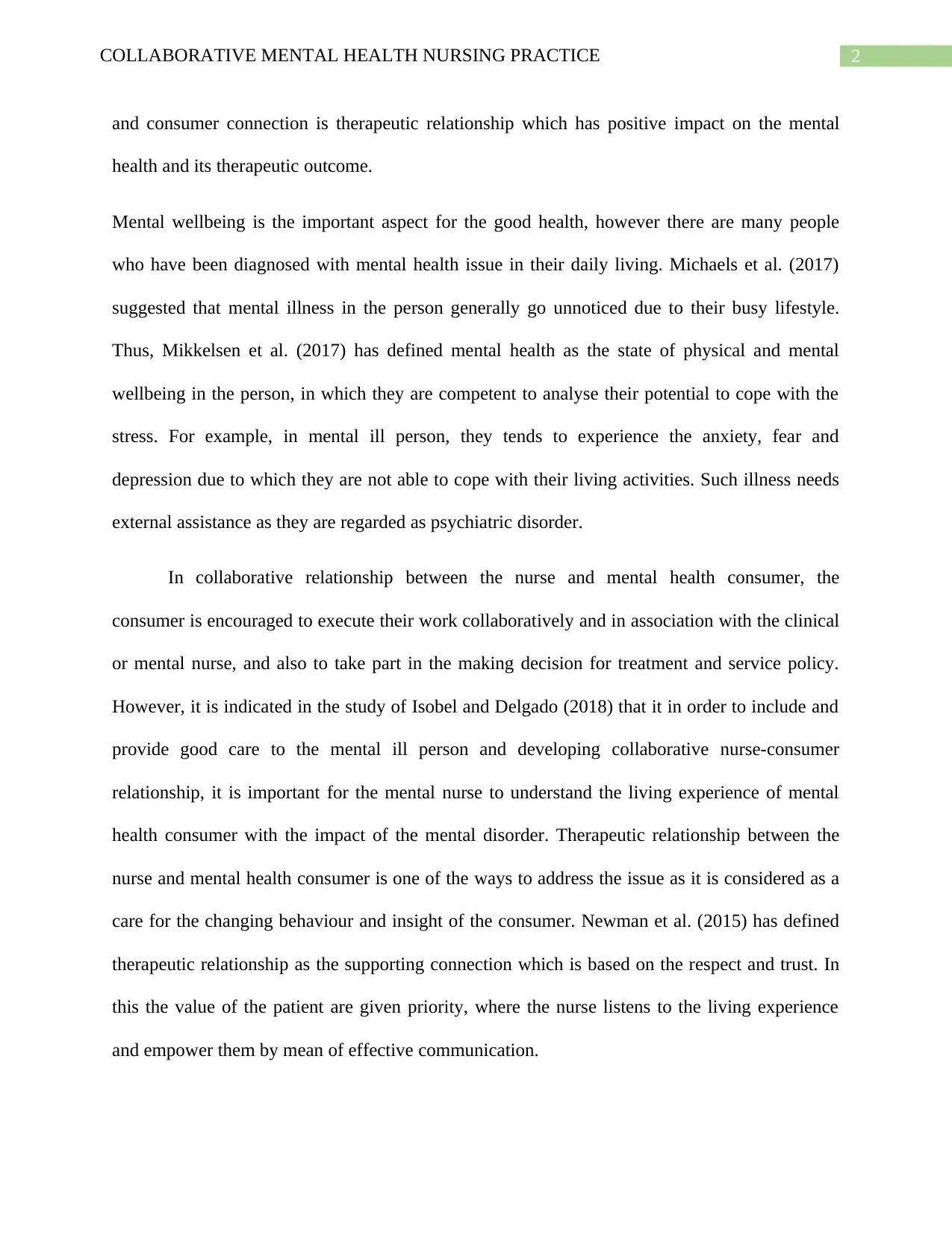
2COLLABORATIVE MENTAL HEALTH NURSING PRACTICE
and consumer connection is therapeutic relationship which has positive impact on the mental
health and its therapeutic outcome.
Mental wellbeing is the important aspect for the good health, however there are many people
who have been diagnosed with mental health issue in their daily living. Michaels et al. (2017)
suggested that mental illness in the person generally go unnoticed due to their busy lifestyle.
Thus, Mikkelsen et al. (2017) has defined mental health as the state of physical and mental
wellbeing in the person, in which they are competent to analyse their potential to cope with the
stress. For example, in mental ill person, they tends to experience the anxiety, fear and
depression due to which they are not able to cope with their living activities. Such illness needs
external assistance as they are regarded as psychiatric disorder.
In collaborative relationship between the nurse and mental health consumer, the
consumer is encouraged to execute their work collaboratively and in association with the clinical
or mental nurse, and also to take part in the making decision for treatment and service policy.
However, it is indicated in the study of Isobel and Delgado (2018) that it in order to include and
provide good care to the mental ill person and developing collaborative nurse-consumer
relationship, it is important for the mental nurse to understand the living experience of mental
health consumer with the impact of the mental disorder. Therapeutic relationship between the
nurse and mental health consumer is one of the ways to address the issue as it is considered as a
care for the changing behaviour and insight of the consumer. Newman et al. (2015) has defined
therapeutic relationship as the supporting connection which is based on the respect and trust. In
this the value of the patient are given priority, where the nurse listens to the living experience
and empower them by mean of effective communication.
and consumer connection is therapeutic relationship which has positive impact on the mental
health and its therapeutic outcome.
Mental wellbeing is the important aspect for the good health, however there are many people
who have been diagnosed with mental health issue in their daily living. Michaels et al. (2017)
suggested that mental illness in the person generally go unnoticed due to their busy lifestyle.
Thus, Mikkelsen et al. (2017) has defined mental health as the state of physical and mental
wellbeing in the person, in which they are competent to analyse their potential to cope with the
stress. For example, in mental ill person, they tends to experience the anxiety, fear and
depression due to which they are not able to cope with their living activities. Such illness needs
external assistance as they are regarded as psychiatric disorder.
In collaborative relationship between the nurse and mental health consumer, the
consumer is encouraged to execute their work collaboratively and in association with the clinical
or mental nurse, and also to take part in the making decision for treatment and service policy.
However, it is indicated in the study of Isobel and Delgado (2018) that it in order to include and
provide good care to the mental ill person and developing collaborative nurse-consumer
relationship, it is important for the mental nurse to understand the living experience of mental
health consumer with the impact of the mental disorder. Therapeutic relationship between the
nurse and mental health consumer is one of the ways to address the issue as it is considered as a
care for the changing behaviour and insight of the consumer. Newman et al. (2015) has defined
therapeutic relationship as the supporting connection which is based on the respect and trust. In
this the value of the patient are given priority, where the nurse listens to the living experience
and empower them by mean of effective communication.
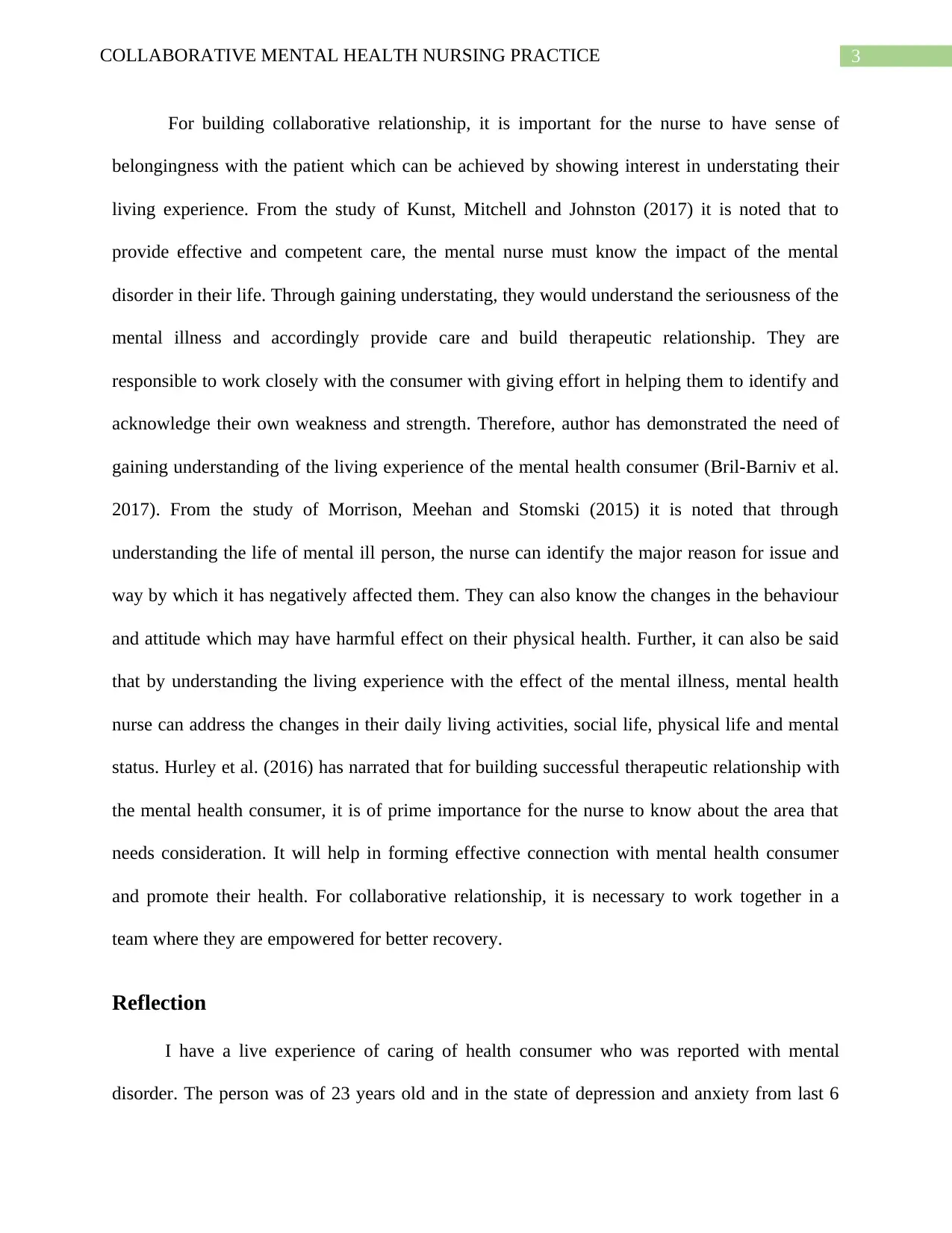
3COLLABORATIVE MENTAL HEALTH NURSING PRACTICE
For building collaborative relationship, it is important for the nurse to have sense of
belongingness with the patient which can be achieved by showing interest in understating their
living experience. From the study of Kunst, Mitchell and Johnston (2017) it is noted that to
provide effective and competent care, the mental nurse must know the impact of the mental
disorder in their life. Through gaining understating, they would understand the seriousness of the
mental illness and accordingly provide care and build therapeutic relationship. They are
responsible to work closely with the consumer with giving effort in helping them to identify and
acknowledge their own weakness and strength. Therefore, author has demonstrated the need of
gaining understanding of the living experience of the mental health consumer (Bril-Barniv et al.
2017). From the study of Morrison, Meehan and Stomski (2015) it is noted that through
understanding the life of mental ill person, the nurse can identify the major reason for issue and
way by which it has negatively affected them. They can also know the changes in the behaviour
and attitude which may have harmful effect on their physical health. Further, it can also be said
that by understanding the living experience with the effect of the mental illness, mental health
nurse can address the changes in their daily living activities, social life, physical life and mental
status. Hurley et al. (2016) has narrated that for building successful therapeutic relationship with
the mental health consumer, it is of prime importance for the nurse to know about the area that
needs consideration. It will help in forming effective connection with mental health consumer
and promote their health. For collaborative relationship, it is necessary to work together in a
team where they are empowered for better recovery.
Reflection
I have a live experience of caring of health consumer who was reported with mental
disorder. The person was of 23 years old and in the state of depression and anxiety from last 6
For building collaborative relationship, it is important for the nurse to have sense of
belongingness with the patient which can be achieved by showing interest in understating their
living experience. From the study of Kunst, Mitchell and Johnston (2017) it is noted that to
provide effective and competent care, the mental nurse must know the impact of the mental
disorder in their life. Through gaining understating, they would understand the seriousness of the
mental illness and accordingly provide care and build therapeutic relationship. They are
responsible to work closely with the consumer with giving effort in helping them to identify and
acknowledge their own weakness and strength. Therefore, author has demonstrated the need of
gaining understanding of the living experience of the mental health consumer (Bril-Barniv et al.
2017). From the study of Morrison, Meehan and Stomski (2015) it is noted that through
understanding the life of mental ill person, the nurse can identify the major reason for issue and
way by which it has negatively affected them. They can also know the changes in the behaviour
and attitude which may have harmful effect on their physical health. Further, it can also be said
that by understanding the living experience with the effect of the mental illness, mental health
nurse can address the changes in their daily living activities, social life, physical life and mental
status. Hurley et al. (2016) has narrated that for building successful therapeutic relationship with
the mental health consumer, it is of prime importance for the nurse to know about the area that
needs consideration. It will help in forming effective connection with mental health consumer
and promote their health. For collaborative relationship, it is necessary to work together in a
team where they are empowered for better recovery.
Reflection
I have a live experience of caring of health consumer who was reported with mental
disorder. The person was of 23 years old and in the state of depression and anxiety from last 6
Secure Best Marks with AI Grader
Need help grading? Try our AI Grader for instant feedback on your assignments.
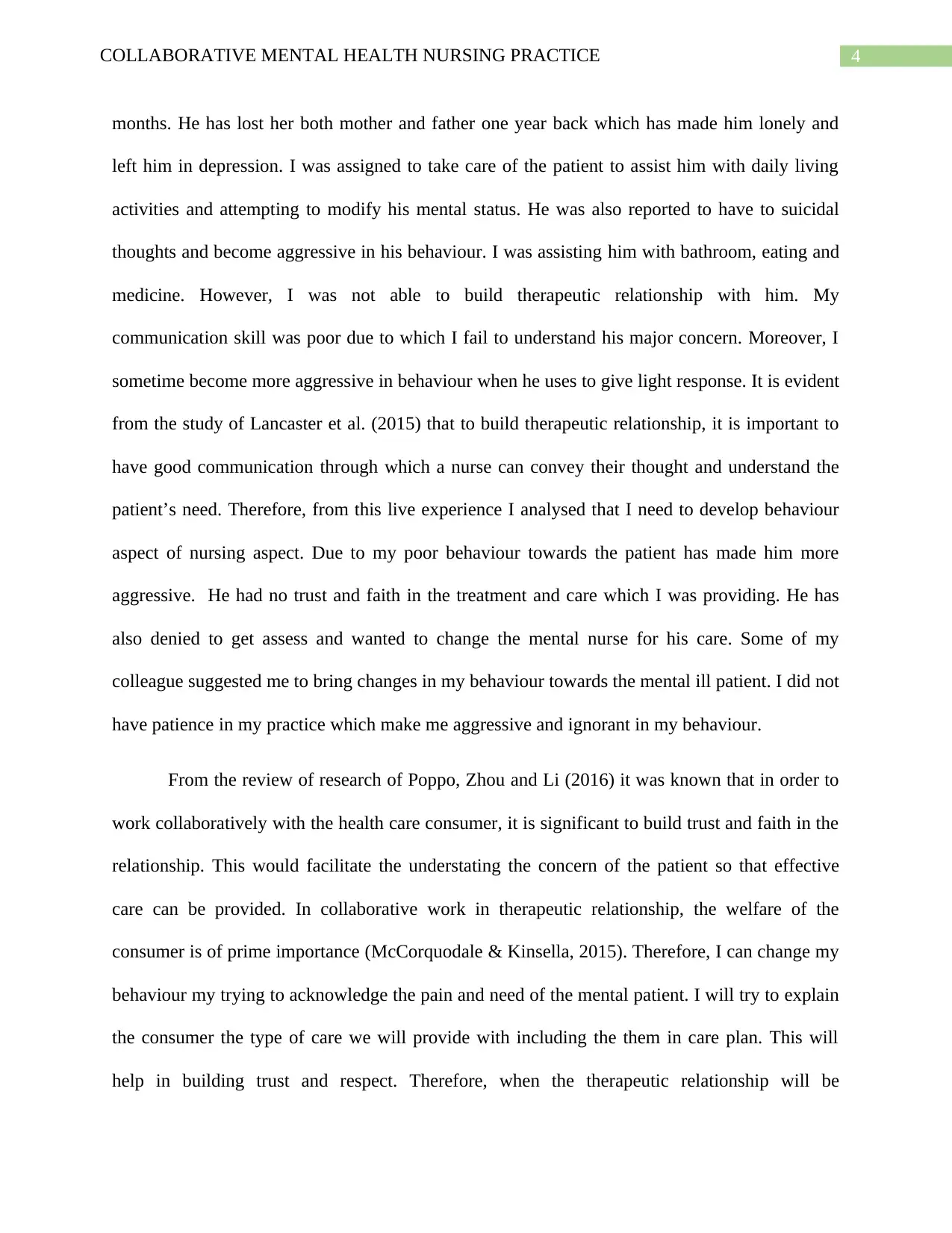
4COLLABORATIVE MENTAL HEALTH NURSING PRACTICE
months. He has lost her both mother and father one year back which has made him lonely and
left him in depression. I was assigned to take care of the patient to assist him with daily living
activities and attempting to modify his mental status. He was also reported to have to suicidal
thoughts and become aggressive in his behaviour. I was assisting him with bathroom, eating and
medicine. However, I was not able to build therapeutic relationship with him. My
communication skill was poor due to which I fail to understand his major concern. Moreover, I
sometime become more aggressive in behaviour when he uses to give light response. It is evident
from the study of Lancaster et al. (2015) that to build therapeutic relationship, it is important to
have good communication through which a nurse can convey their thought and understand the
patient’s need. Therefore, from this live experience I analysed that I need to develop behaviour
aspect of nursing aspect. Due to my poor behaviour towards the patient has made him more
aggressive. He had no trust and faith in the treatment and care which I was providing. He has
also denied to get assess and wanted to change the mental nurse for his care. Some of my
colleague suggested me to bring changes in my behaviour towards the mental ill patient. I did not
have patience in my practice which make me aggressive and ignorant in my behaviour.
From the review of research of Poppo, Zhou and Li (2016) it was known that in order to
work collaboratively with the health care consumer, it is significant to build trust and faith in the
relationship. This would facilitate the understating the concern of the patient so that effective
care can be provided. In collaborative work in therapeutic relationship, the welfare of the
consumer is of prime importance (McCorquodale & Kinsella, 2015). Therefore, I can change my
behaviour my trying to acknowledge the pain and need of the mental patient. I will try to explain
the consumer the type of care we will provide with including the them in care plan. This will
help in building trust and respect. Therefore, when the therapeutic relationship will be
months. He has lost her both mother and father one year back which has made him lonely and
left him in depression. I was assigned to take care of the patient to assist him with daily living
activities and attempting to modify his mental status. He was also reported to have to suicidal
thoughts and become aggressive in his behaviour. I was assisting him with bathroom, eating and
medicine. However, I was not able to build therapeutic relationship with him. My
communication skill was poor due to which I fail to understand his major concern. Moreover, I
sometime become more aggressive in behaviour when he uses to give light response. It is evident
from the study of Lancaster et al. (2015) that to build therapeutic relationship, it is important to
have good communication through which a nurse can convey their thought and understand the
patient’s need. Therefore, from this live experience I analysed that I need to develop behaviour
aspect of nursing aspect. Due to my poor behaviour towards the patient has made him more
aggressive. He had no trust and faith in the treatment and care which I was providing. He has
also denied to get assess and wanted to change the mental nurse for his care. Some of my
colleague suggested me to bring changes in my behaviour towards the mental ill patient. I did not
have patience in my practice which make me aggressive and ignorant in my behaviour.
From the review of research of Poppo, Zhou and Li (2016) it was known that in order to
work collaboratively with the health care consumer, it is significant to build trust and faith in the
relationship. This would facilitate the understating the concern of the patient so that effective
care can be provided. In collaborative work in therapeutic relationship, the welfare of the
consumer is of prime importance (McCorquodale & Kinsella, 2015). Therefore, I can change my
behaviour my trying to acknowledge the pain and need of the mental patient. I will try to explain
the consumer the type of care we will provide with including the them in care plan. This will
help in building trust and respect. Therefore, when the therapeutic relationship will be
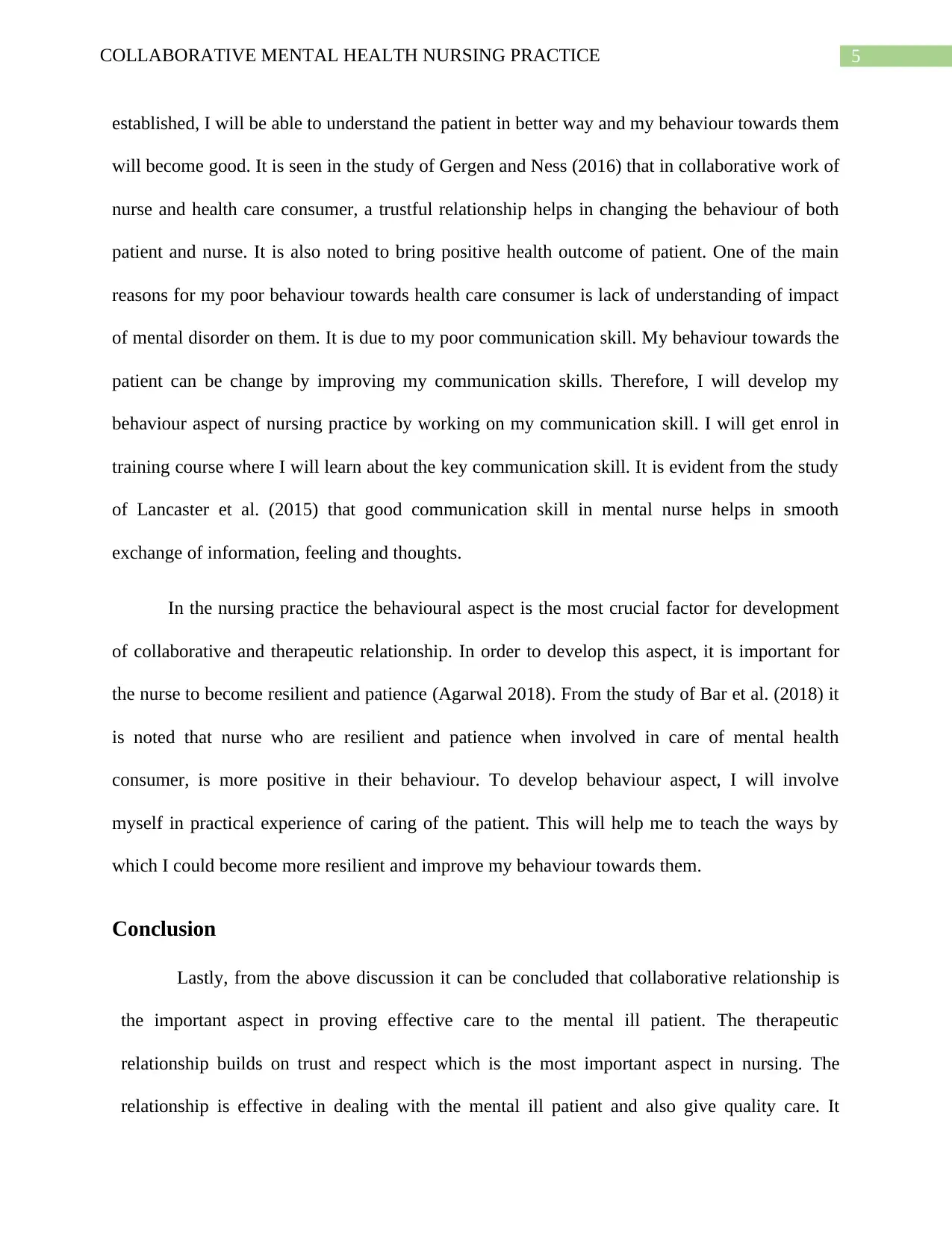
5COLLABORATIVE MENTAL HEALTH NURSING PRACTICE
established, I will be able to understand the patient in better way and my behaviour towards them
will become good. It is seen in the study of Gergen and Ness (2016) that in collaborative work of
nurse and health care consumer, a trustful relationship helps in changing the behaviour of both
patient and nurse. It is also noted to bring positive health outcome of patient. One of the main
reasons for my poor behaviour towards health care consumer is lack of understanding of impact
of mental disorder on them. It is due to my poor communication skill. My behaviour towards the
patient can be change by improving my communication skills. Therefore, I will develop my
behaviour aspect of nursing practice by working on my communication skill. I will get enrol in
training course where I will learn about the key communication skill. It is evident from the study
of Lancaster et al. (2015) that good communication skill in mental nurse helps in smooth
exchange of information, feeling and thoughts.
In the nursing practice the behavioural aspect is the most crucial factor for development
of collaborative and therapeutic relationship. In order to develop this aspect, it is important for
the nurse to become resilient and patience (Agarwal 2018). From the study of Bar et al. (2018) it
is noted that nurse who are resilient and patience when involved in care of mental health
consumer, is more positive in their behaviour. To develop behaviour aspect, I will involve
myself in practical experience of caring of the patient. This will help me to teach the ways by
which I could become more resilient and improve my behaviour towards them.
Conclusion
Lastly, from the above discussion it can be concluded that collaborative relationship is
the important aspect in proving effective care to the mental ill patient. The therapeutic
relationship builds on trust and respect which is the most important aspect in nursing. The
relationship is effective in dealing with the mental ill patient and also give quality care. It
established, I will be able to understand the patient in better way and my behaviour towards them
will become good. It is seen in the study of Gergen and Ness (2016) that in collaborative work of
nurse and health care consumer, a trustful relationship helps in changing the behaviour of both
patient and nurse. It is also noted to bring positive health outcome of patient. One of the main
reasons for my poor behaviour towards health care consumer is lack of understanding of impact
of mental disorder on them. It is due to my poor communication skill. My behaviour towards the
patient can be change by improving my communication skills. Therefore, I will develop my
behaviour aspect of nursing practice by working on my communication skill. I will get enrol in
training course where I will learn about the key communication skill. It is evident from the study
of Lancaster et al. (2015) that good communication skill in mental nurse helps in smooth
exchange of information, feeling and thoughts.
In the nursing practice the behavioural aspect is the most crucial factor for development
of collaborative and therapeutic relationship. In order to develop this aspect, it is important for
the nurse to become resilient and patience (Agarwal 2018). From the study of Bar et al. (2018) it
is noted that nurse who are resilient and patience when involved in care of mental health
consumer, is more positive in their behaviour. To develop behaviour aspect, I will involve
myself in practical experience of caring of the patient. This will help me to teach the ways by
which I could become more resilient and improve my behaviour towards them.
Conclusion
Lastly, from the above discussion it can be concluded that collaborative relationship is
the important aspect in proving effective care to the mental ill patient. The therapeutic
relationship builds on trust and respect which is the most important aspect in nursing. The
relationship is effective in dealing with the mental ill patient and also give quality care. It
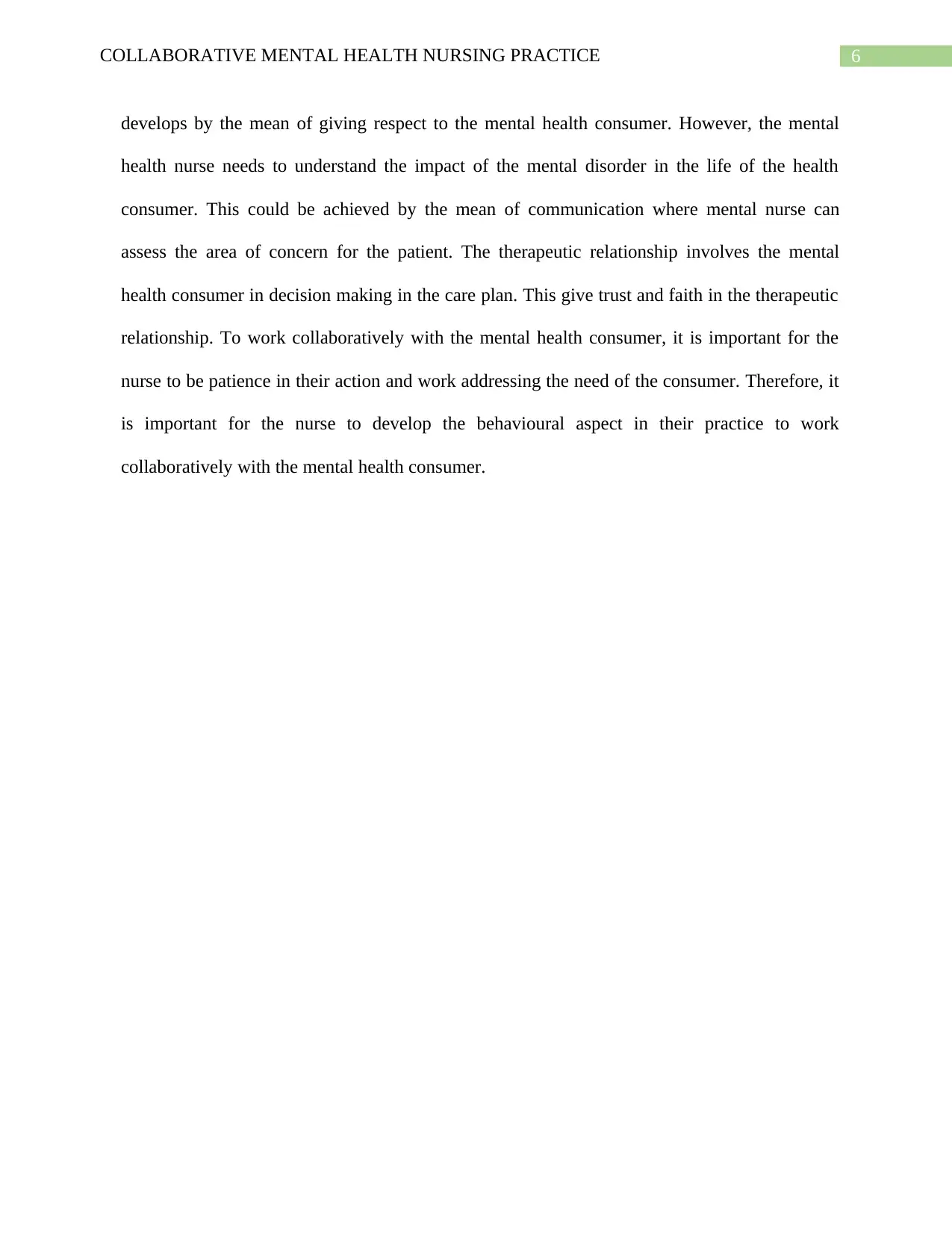
6COLLABORATIVE MENTAL HEALTH NURSING PRACTICE
develops by the mean of giving respect to the mental health consumer. However, the mental
health nurse needs to understand the impact of the mental disorder in the life of the health
consumer. This could be achieved by the mean of communication where mental nurse can
assess the area of concern for the patient. The therapeutic relationship involves the mental
health consumer in decision making in the care plan. This give trust and faith in the therapeutic
relationship. To work collaboratively with the mental health consumer, it is important for the
nurse to be patience in their action and work addressing the need of the consumer. Therefore, it
is important for the nurse to develop the behavioural aspect in their practice to work
collaboratively with the mental health consumer.
develops by the mean of giving respect to the mental health consumer. However, the mental
health nurse needs to understand the impact of the mental disorder in the life of the health
consumer. This could be achieved by the mean of communication where mental nurse can
assess the area of concern for the patient. The therapeutic relationship involves the mental
health consumer in decision making in the care plan. This give trust and faith in the therapeutic
relationship. To work collaboratively with the mental health consumer, it is important for the
nurse to be patience in their action and work addressing the need of the consumer. Therefore, it
is important for the nurse to develop the behavioural aspect in their practice to work
collaboratively with the mental health consumer.
Paraphrase This Document
Need a fresh take? Get an instant paraphrase of this document with our AI Paraphraser
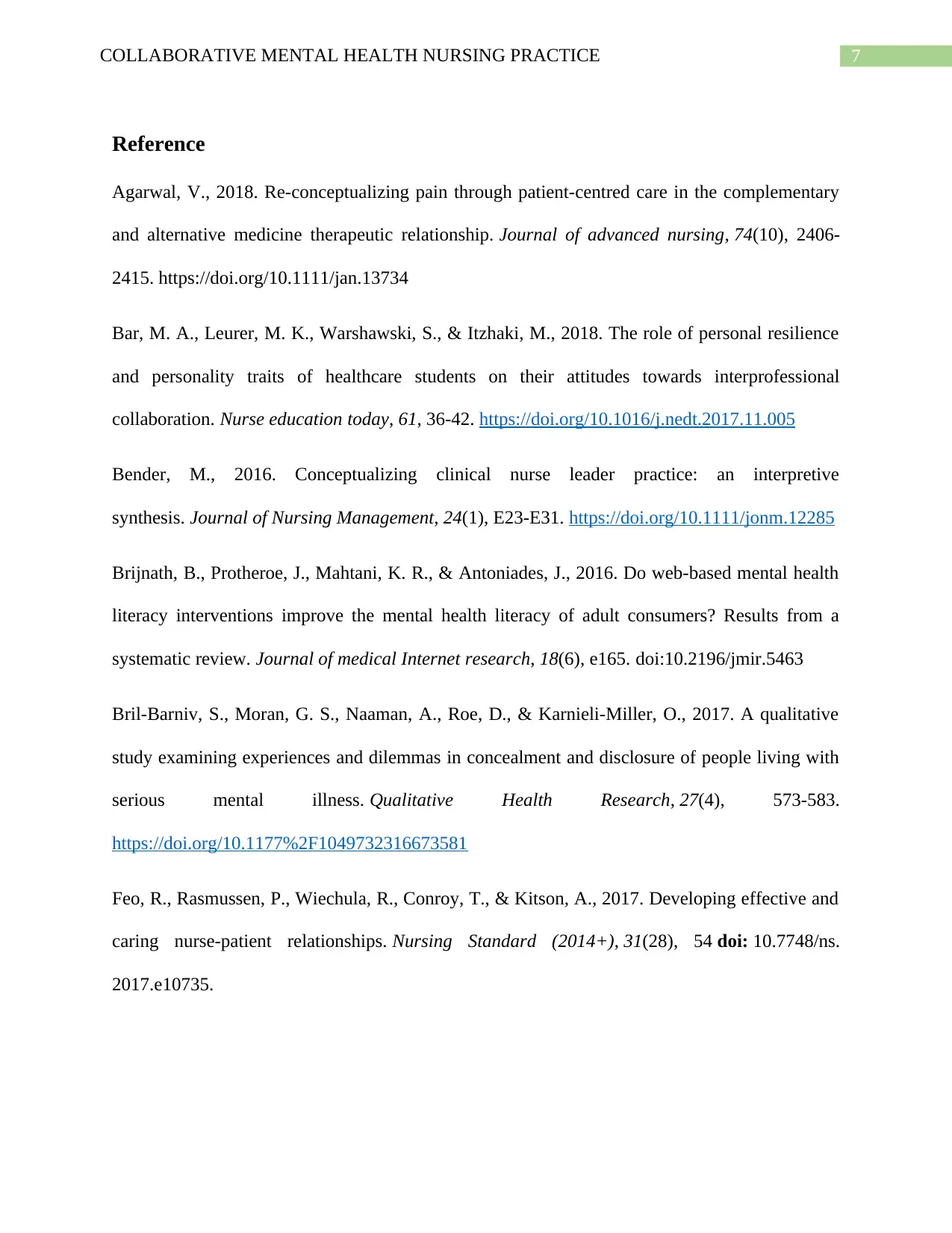
7COLLABORATIVE MENTAL HEALTH NURSING PRACTICE
Reference
Agarwal, V., 2018. Re‐conceptualizing pain through patient‐centred care in the complementary
and alternative medicine therapeutic relationship. Journal of advanced nursing, 74(10), 2406-
2415. https://doi.org/10.1111/jan.13734
Bar, M. A., Leurer, M. K., Warshawski, S., & Itzhaki, M., 2018. The role of personal resilience
and personality traits of healthcare students on their attitudes towards interprofessional
collaboration. Nurse education today, 61, 36-42. https://doi.org/10.1016/j.nedt.2017.11.005
Bender, M., 2016. Conceptualizing clinical nurse leader practice: an interpretive
synthesis. Journal of Nursing Management, 24(1), E23-E31. https://doi.org/10.1111/jonm.12285
Brijnath, B., Protheroe, J., Mahtani, K. R., & Antoniades, J., 2016. Do web-based mental health
literacy interventions improve the mental health literacy of adult consumers? Results from a
systematic review. Journal of medical Internet research, 18(6), e165. doi:10.2196/jmir.5463
Bril-Barniv, S., Moran, G. S., Naaman, A., Roe, D., & Karnieli-Miller, O., 2017. A qualitative
study examining experiences and dilemmas in concealment and disclosure of people living with
serious mental illness. Qualitative Health Research, 27(4), 573-583.
https://doi.org/10.1177%2F1049732316673581
Feo, R., Rasmussen, P., Wiechula, R., Conroy, T., & Kitson, A., 2017. Developing effective and
caring nurse-patient relationships. Nursing Standard (2014+), 31(28), 54 doi: 10.7748/ns.
2017.e10735.
Reference
Agarwal, V., 2018. Re‐conceptualizing pain through patient‐centred care in the complementary
and alternative medicine therapeutic relationship. Journal of advanced nursing, 74(10), 2406-
2415. https://doi.org/10.1111/jan.13734
Bar, M. A., Leurer, M. K., Warshawski, S., & Itzhaki, M., 2018. The role of personal resilience
and personality traits of healthcare students on their attitudes towards interprofessional
collaboration. Nurse education today, 61, 36-42. https://doi.org/10.1016/j.nedt.2017.11.005
Bender, M., 2016. Conceptualizing clinical nurse leader practice: an interpretive
synthesis. Journal of Nursing Management, 24(1), E23-E31. https://doi.org/10.1111/jonm.12285
Brijnath, B., Protheroe, J., Mahtani, K. R., & Antoniades, J., 2016. Do web-based mental health
literacy interventions improve the mental health literacy of adult consumers? Results from a
systematic review. Journal of medical Internet research, 18(6), e165. doi:10.2196/jmir.5463
Bril-Barniv, S., Moran, G. S., Naaman, A., Roe, D., & Karnieli-Miller, O., 2017. A qualitative
study examining experiences and dilemmas in concealment and disclosure of people living with
serious mental illness. Qualitative Health Research, 27(4), 573-583.
https://doi.org/10.1177%2F1049732316673581
Feo, R., Rasmussen, P., Wiechula, R., Conroy, T., & Kitson, A., 2017. Developing effective and
caring nurse-patient relationships. Nursing Standard (2014+), 31(28), 54 doi: 10.7748/ns.
2017.e10735.
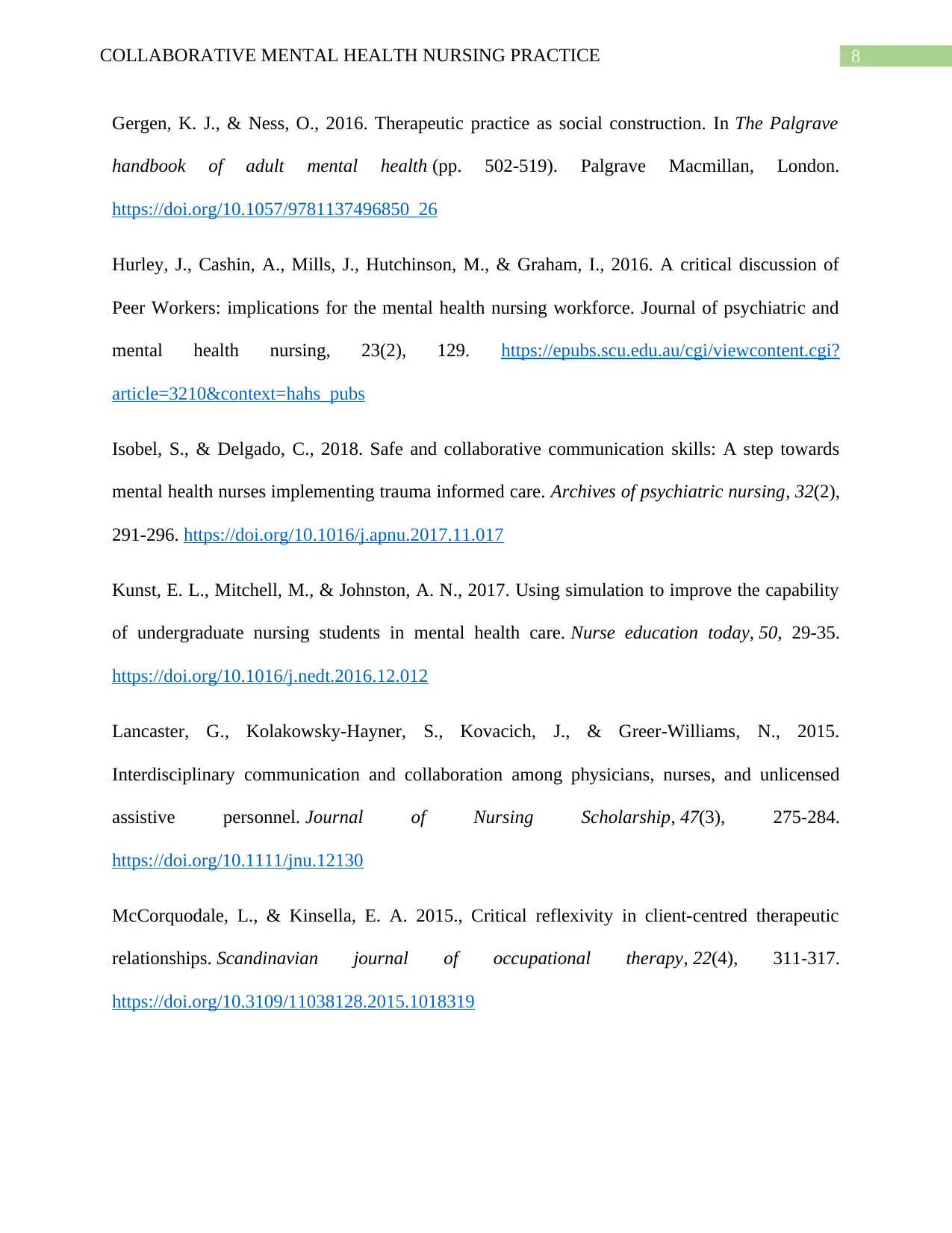
8COLLABORATIVE MENTAL HEALTH NURSING PRACTICE
Gergen, K. J., & Ness, O., 2016. Therapeutic practice as social construction. In The Palgrave
handbook of adult mental health (pp. 502-519). Palgrave Macmillan, London.
https://doi.org/10.1057/9781137496850_26
Hurley, J., Cashin, A., Mills, J., Hutchinson, M., & Graham, I., 2016. A critical discussion of
Peer Workers: implications for the mental health nursing workforce. Journal of psychiatric and
mental health nursing, 23(2), 129. https://epubs.scu.edu.au/cgi/viewcontent.cgi?
article=3210&context=hahs_pubs
Isobel, S., & Delgado, C., 2018. Safe and collaborative communication skills: A step towards
mental health nurses implementing trauma informed care. Archives of psychiatric nursing, 32(2),
291-296. https://doi.org/10.1016/j.apnu.2017.11.017
Kunst, E. L., Mitchell, M., & Johnston, A. N., 2017. Using simulation to improve the capability
of undergraduate nursing students in mental health care. Nurse education today, 50, 29-35.
https://doi.org/10.1016/j.nedt.2016.12.012
Lancaster, G., Kolakowsky‐Hayner, S., Kovacich, J., & Greer‐Williams, N., 2015.
Interdisciplinary communication and collaboration among physicians, nurses, and unlicensed
assistive personnel. Journal of Nursing Scholarship, 47(3), 275-284.
https://doi.org/10.1111/jnu.12130
McCorquodale, L., & Kinsella, E. A. 2015., Critical reflexivity in client-centred therapeutic
relationships. Scandinavian journal of occupational therapy, 22(4), 311-317.
https://doi.org/10.3109/11038128.2015.1018319
Gergen, K. J., & Ness, O., 2016. Therapeutic practice as social construction. In The Palgrave
handbook of adult mental health (pp. 502-519). Palgrave Macmillan, London.
https://doi.org/10.1057/9781137496850_26
Hurley, J., Cashin, A., Mills, J., Hutchinson, M., & Graham, I., 2016. A critical discussion of
Peer Workers: implications for the mental health nursing workforce. Journal of psychiatric and
mental health nursing, 23(2), 129. https://epubs.scu.edu.au/cgi/viewcontent.cgi?
article=3210&context=hahs_pubs
Isobel, S., & Delgado, C., 2018. Safe and collaborative communication skills: A step towards
mental health nurses implementing trauma informed care. Archives of psychiatric nursing, 32(2),
291-296. https://doi.org/10.1016/j.apnu.2017.11.017
Kunst, E. L., Mitchell, M., & Johnston, A. N., 2017. Using simulation to improve the capability
of undergraduate nursing students in mental health care. Nurse education today, 50, 29-35.
https://doi.org/10.1016/j.nedt.2016.12.012
Lancaster, G., Kolakowsky‐Hayner, S., Kovacich, J., & Greer‐Williams, N., 2015.
Interdisciplinary communication and collaboration among physicians, nurses, and unlicensed
assistive personnel. Journal of Nursing Scholarship, 47(3), 275-284.
https://doi.org/10.1111/jnu.12130
McCorquodale, L., & Kinsella, E. A. 2015., Critical reflexivity in client-centred therapeutic
relationships. Scandinavian journal of occupational therapy, 22(4), 311-317.
https://doi.org/10.3109/11038128.2015.1018319
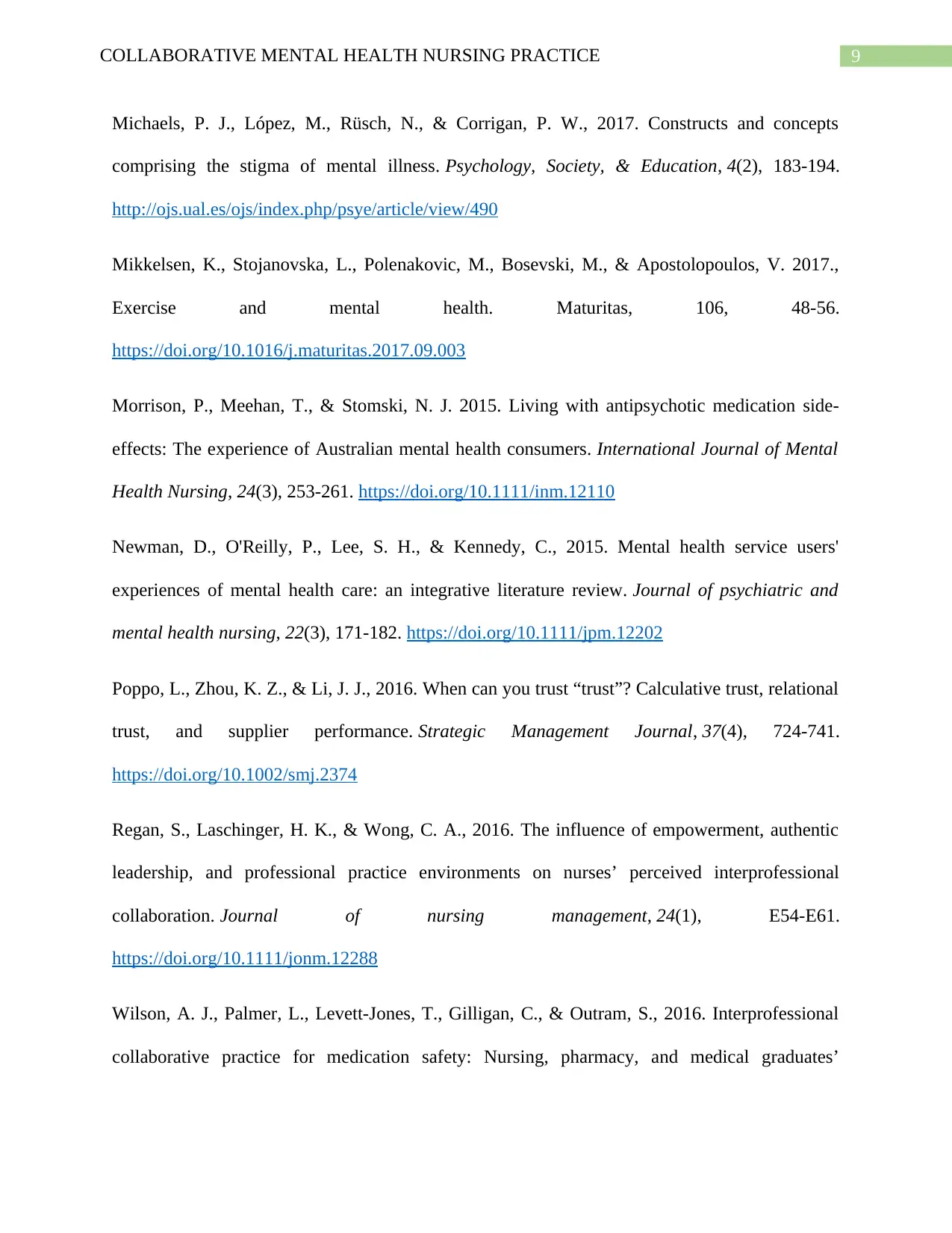
9COLLABORATIVE MENTAL HEALTH NURSING PRACTICE
Michaels, P. J., López, M., Rüsch, N., & Corrigan, P. W., 2017. Constructs and concepts
comprising the stigma of mental illness. Psychology, Society, & Education, 4(2), 183-194.
http://ojs.ual.es/ojs/index.php/psye/article/view/490
Mikkelsen, K., Stojanovska, L., Polenakovic, M., Bosevski, M., & Apostolopoulos, V. 2017.,
Exercise and mental health. Maturitas, 106, 48-56.
https://doi.org/10.1016/j.maturitas.2017.09.003
Morrison, P., Meehan, T., & Stomski, N. J. 2015. Living with antipsychotic medication side‐
effects: The experience of Australian mental health consumers. International Journal of Mental
Health Nursing, 24(3), 253-261. https://doi.org/10.1111/inm.12110
Newman, D., O'Reilly, P., Lee, S. H., & Kennedy, C., 2015. Mental health service users'
experiences of mental health care: an integrative literature review. Journal of psychiatric and
mental health nursing, 22(3), 171-182. https://doi.org/10.1111/jpm.12202
Poppo, L., Zhou, K. Z., & Li, J. J., 2016. When can you trust “trust”? Calculative trust, relational
trust, and supplier performance. Strategic Management Journal, 37(4), 724-741.
https://doi.org/10.1002/smj.2374
Regan, S., Laschinger, H. K., & Wong, C. A., 2016. The influence of empowerment, authentic
leadership, and professional practice environments on nurses’ perceived interprofessional
collaboration. Journal of nursing management, 24(1), E54-E61.
https://doi.org/10.1111/jonm.12288
Wilson, A. J., Palmer, L., Levett-Jones, T., Gilligan, C., & Outram, S., 2016. Interprofessional
collaborative practice for medication safety: Nursing, pharmacy, and medical graduates’
Michaels, P. J., López, M., Rüsch, N., & Corrigan, P. W., 2017. Constructs and concepts
comprising the stigma of mental illness. Psychology, Society, & Education, 4(2), 183-194.
http://ojs.ual.es/ojs/index.php/psye/article/view/490
Mikkelsen, K., Stojanovska, L., Polenakovic, M., Bosevski, M., & Apostolopoulos, V. 2017.,
Exercise and mental health. Maturitas, 106, 48-56.
https://doi.org/10.1016/j.maturitas.2017.09.003
Morrison, P., Meehan, T., & Stomski, N. J. 2015. Living with antipsychotic medication side‐
effects: The experience of Australian mental health consumers. International Journal of Mental
Health Nursing, 24(3), 253-261. https://doi.org/10.1111/inm.12110
Newman, D., O'Reilly, P., Lee, S. H., & Kennedy, C., 2015. Mental health service users'
experiences of mental health care: an integrative literature review. Journal of psychiatric and
mental health nursing, 22(3), 171-182. https://doi.org/10.1111/jpm.12202
Poppo, L., Zhou, K. Z., & Li, J. J., 2016. When can you trust “trust”? Calculative trust, relational
trust, and supplier performance. Strategic Management Journal, 37(4), 724-741.
https://doi.org/10.1002/smj.2374
Regan, S., Laschinger, H. K., & Wong, C. A., 2016. The influence of empowerment, authentic
leadership, and professional practice environments on nurses’ perceived interprofessional
collaboration. Journal of nursing management, 24(1), E54-E61.
https://doi.org/10.1111/jonm.12288
Wilson, A. J., Palmer, L., Levett-Jones, T., Gilligan, C., & Outram, S., 2016. Interprofessional
collaborative practice for medication safety: Nursing, pharmacy, and medical graduates’
Secure Best Marks with AI Grader
Need help grading? Try our AI Grader for instant feedback on your assignments.
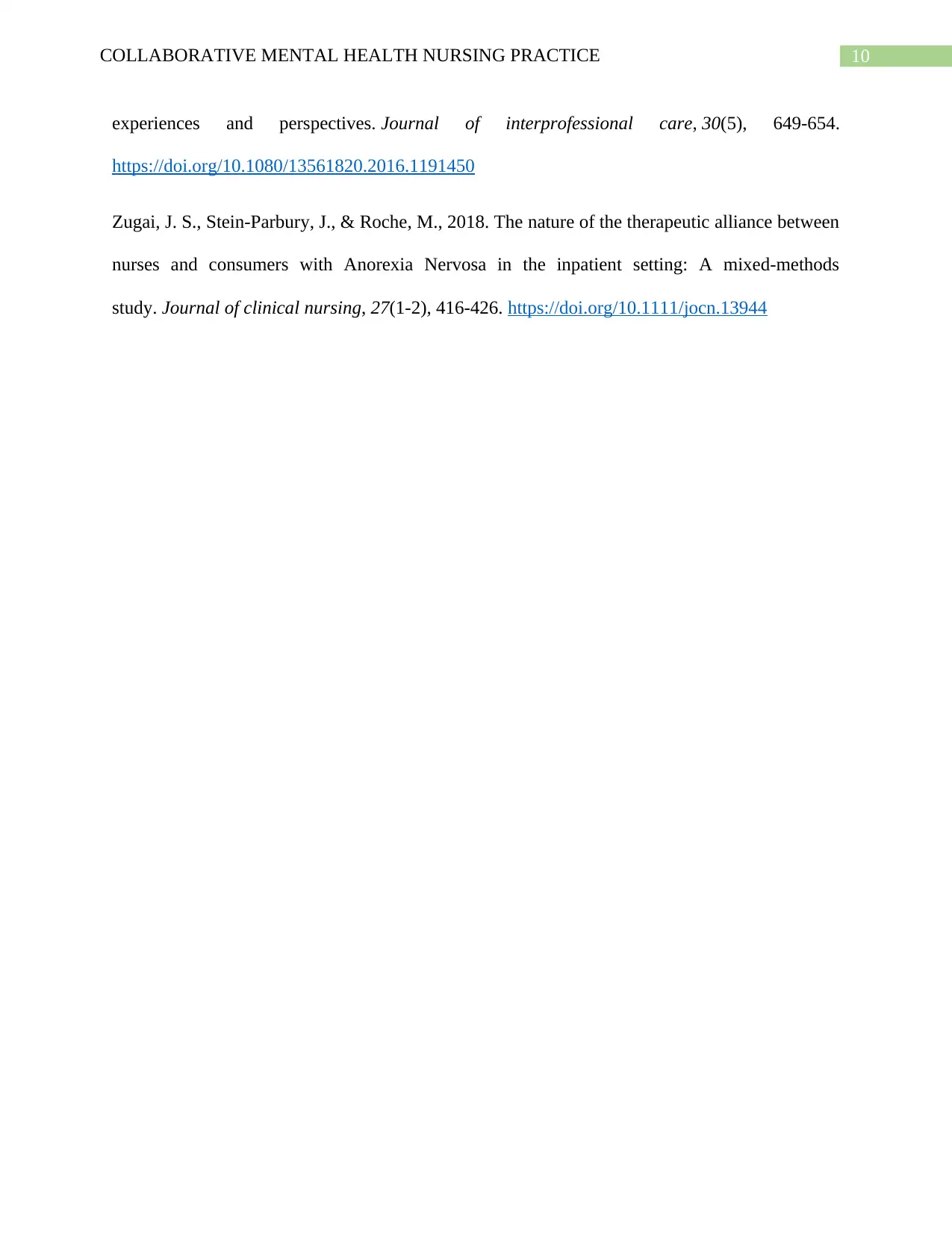
10COLLABORATIVE MENTAL HEALTH NURSING PRACTICE
experiences and perspectives. Journal of interprofessional care, 30(5), 649-654.
https://doi.org/10.1080/13561820.2016.1191450
Zugai, J. S., Stein‐Parbury, J., & Roche, M., 2018. The nature of the therapeutic alliance between
nurses and consumers with Anorexia Nervosa in the inpatient setting: A mixed‐methods
study. Journal of clinical nursing, 27(1-2), 416-426. https://doi.org/10.1111/jocn.13944
experiences and perspectives. Journal of interprofessional care, 30(5), 649-654.
https://doi.org/10.1080/13561820.2016.1191450
Zugai, J. S., Stein‐Parbury, J., & Roche, M., 2018. The nature of the therapeutic alliance between
nurses and consumers with Anorexia Nervosa in the inpatient setting: A mixed‐methods
study. Journal of clinical nursing, 27(1-2), 416-426. https://doi.org/10.1111/jocn.13944
1 out of 11
Related Documents
Your All-in-One AI-Powered Toolkit for Academic Success.
+13062052269
info@desklib.com
Available 24*7 on WhatsApp / Email
![[object Object]](/_next/static/media/star-bottom.7253800d.svg)
Unlock your academic potential
© 2024 | Zucol Services PVT LTD | All rights reserved.





